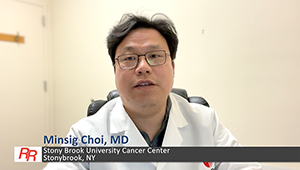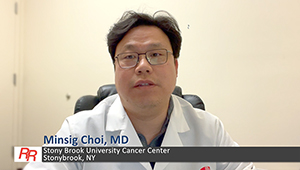In patients with resectable gastric adenocarcinoma or esophagogastric adenocarcinoma (EGA) having microsatellite instability (MSI)-high/mismatch repair deficient (dMMR) tumors, radical surgery is regarded as the only curative option, with no clinical benefit from perioperative chemotherapy. Given that MSI-high/dMMR status is predictive for the efficacy of immune checkpoint inhibitors, the GERCOR NEONIPIGA phase 2 study evaluated the efficacy and safety of neoadjuvant nivolumab + ipilimumab followed by adjuvant nivolumab in patients with resectable gastric adenocarcinoma or EGA having MSI-high/dMMR tumors. Results from the study were presented at the 2022 American Society of Clinical Oncology Gastrointestinal Cancers Symposium.
The study enrolled patients with resectable gastric adenocarcinoma or EGA that had MSI-high/dMMR, T2-T4NxM0 tumors from October 2019 to June 2021. Eligible patients received nivolumab 240 mg every 2 weeks (6 infusions) and ipilimumab 1 mg/kg every 6 weeks (2 infusions), followed by radical surgery 5 weeks (±1 week) after the last injection of nivolumab. Patients with Becker tumor regression grade (TRG) <3 were treated with adjuvant nivolumab 480 mg every 4 weeks (9 infusions). The primary end point was the pathologic complete response (pCR) rate.
A total of 32 patients were enrolled; of these, 16 patients had gastric cancer and 16 had EGA, and all had dMMR±MSI-high status. The median age was 65 years (range, 40-80 years). Initial stage was: usT3Nx = 22, usT2Nx = 4, and 6 patients were not evaluable by ultrasound endoscopy.
At database lock, 27 (84%) patients had completed all 6 neoadjuvant cycles. During neoadjuvant treatment, 8 (25%) patients experienced grade 3/4 adverse events (AEs), and 5 patients experienced grade 3/4 AEs that led to study discontinuation. Grade 3/4 AEs included colitis/ileitis (n = 6), hepatitis (n = 6), decreased appetite (n = 6), diarrhea (n = 3), adrenal insufficiency (n = 3), and vomiting (n = 3).
A total of 29 patients subsequently underwent surgery. The median delay between the last injection and surgery was 35 days (range, 25-170 days). Overall, surgical morbidity (peri- and/or postoperative until 90 days postoperative) occurred in 17 (58.5%) patients, which was as expected. Postoperative complications (n = 22) included fistula (n = 6), pancreatitis (n = 3), ileus (n = 2), pneumonia (n = 2), atrial fibrillation (n = 2), and other (n = 6). The incidence of postoperative mortality was 3.8% (n = 1) due to cardiovascular AEs at postoperative day 3.
All 29 patients who underwent surgery had R0 resection. Per Becker TRG, a total of 17 (59%) patients achieved a pCR (defined as TRG 1a, which is complete tumor regression without residual tumor); 4 (14%) patients achieved TRG 1b (<10% residual tumor per tumor bed), 1 patient achieved TRG 2 (10%-50% of residual tumor), and 7 patients achieved TRG 3 (˃50% of residual tumor). With a median follow-up of 12.0 months, 94% (n = 31) of patients were alive and 30 were relapse-free; 1 patient had metastatic relapse and 1 patient died at day 3 post-surgery without relapse.
Based on these results, it was concluded that neoadjuvant therapy with nivolumab plus ipilimumab was feasible and associated with a far higher pCR rate (59%) in patients with MSI-high/dMMR resectable gastric or EGA adenocarcinoma than would be expected with cytotoxic chemotherapy (~10%). This study opens the way for other studies to potentially change the standard of care in MSI-high/dMMR EGA/gastric adenocarcinoma.
Source
Andre T, Tougeron D, Piessen G, et al. Neoadjuvant nivolumab plus ipilimumab and adjuvant nivolumab in patients (pts) with localized microsatellite instability-high (MSI)/mismatch repair deficient (dMMR) oeso-gastric adenocarcinoma (OGA): the GERCOR NEONIPIGA phase II study. Presented at: 2022 American Society of Clinical Oncology Gastrointestinal Cancers Symposium, January 20-22, 2022. Abstract 244.







